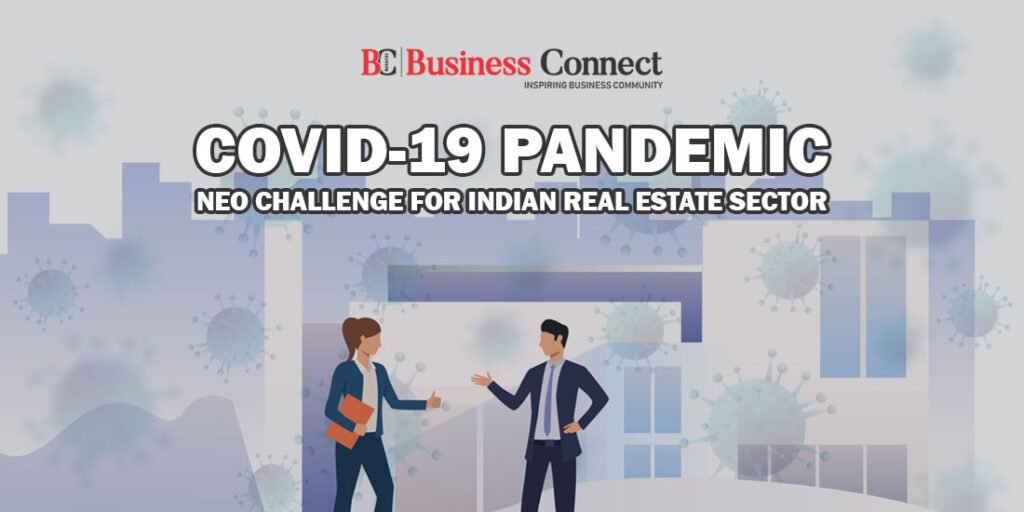COVID-19 PANDEMIC- NEO CHALLENGE FOR INDIAN REAL ESTATE SECTOR
Covid-19 virus, a sufficiently lethal member of the family of RNA viruses, has posed humongous challenges before countries to keep their populations under safety umbrellas. After causing unprecedented death toll in countries like the United States, Italy and Spain, its engulfment has now accelerated in developing nations like India.
Efforts like lockdown followed by staggered exit from the same at few unaffected pockets have played an indispensable role in combating the turbulent wave of the pandemic. However, the aftereffect of this deadly virus on the Indian economy is going to be much more adverse than anticipated. The Purchasing Manager’s Index has witnessed the sharpest decline to 27.4, lowest in the last decade, which exhibits colossal fall in the manufacturing activity in the Indian sector.
The real estate market which was already crippled owing to the weak demand and demonetisation exercise, has been further fronted with another scale to surmount. With enormous stock inventory left unsold in the bags of developers, emerging issues like lack of labour, construction halts may pose serious hurdles. A significant drop in the prices is axiomatically juxtaposed with an increase in the cost of production.
Furthermore, difficulty in completing the projects in well stipulated time period as per RERA guidelines seem to be an arduous task. With businesses experimenting with working from home exercise, the relevance of workspaces/commercial units is undergoing survival test.
In such circumstances, certain steps need to be taken to bring a ray of hope in this quagmire. In respect of section 80IBA of the Income Tax Act 1961, which incentivises developers to build affordable housing for consumers, there is a strong need to increase the time limit for taking approval from competent authority to 31st March 2022. Apart from that, other eligibility clauses viz.
stamp duty ceiling of Rs 45 lakhs needs further escalation. Further, minimum land holding of 1000 and 2000 square metres to claim deduction u/s 80 IBA in metro and non-metro cities respectively, need to be decreased to give opportunity to small-time developers as well. If this section is crafted in a liberal way, the real estate sector can be saved from the asphyxia.
The interest-free period in Vivad se Vishwas scheme, a tax dispute resolution scheme of Ministry of Finance needs a further extension to at least September 30 to give enough time frame to developers to clear their liabilities as they are already suffering from cash deficiency syndrome. This shall, by and large, decrease the disputed amount trapped in litigation and will add to revenue generation which can be readily utilised for boosting the economy.
In view of the huge number of flats unsold, the current provision of exemption from levy of tax on notional rent on such unsold inventories must be increased to 3 years from the date of completion of the project as against 2 years in force today. This can give some breathing space to the cash crunched real estate domain.
On similar lines, significant cuts in GST rates for next quarters can also play a vital role in bringing the sector to a vibrant path. Infusion of capital in the sector in a staggered manner can retrieve the businesses. Apropos this, interests of the real estate companies warrant immediate protection as the foreign investors are ready to engulf them, owing to their undervaluation and capital erosion.
If concrete steps are taken in this regard, the real estate sector can be rejuvenated substantially which shall consequently help the Indian economy to acclimatize. Depreciation in the rupee can be seen as an opportunity to attract foreign investors to park their funds in the Indian real estate sector. Additionally, investors witnessing dusk in the equity and mutual fund sector may look for novel dawn in the real estate domain. Construction of affordable green and sustainable dwelling units rather than luxury units should be the mantra of the developers.
It is also the right time that nature friendly practises with minimum negative externalities like compulsory gas pipeline, solar-powered devices, increased green cover plantations in the project, waste treatment plant should be an inherent part of any housing project. Henceforth, the sector is not to be seen through a myopic eye and a diversified remedy is the need of the hour. A strategic and customised fiscal and monetary policy adopted and executed within the correct temporal frame can surely bring oxygen to the sector.
About the Author
Adv. Sachin P Kumar
(LLM in Business and Corporate Law), Tax Advisor)
The author has done his specialisation in Speech and Hearing from Post Graduate Institute of Medical Education and Research, Chandigarh. During his academic years, he was awarded the degree by Hon’ble Health Minister of India and appreciated by Hon’ble Prime Minister of India. For his research work, he has been awarded Medal by the Minister of State for External Affairs, Smt Parneet Kaur. He has delivered lectures at various national and international conferences and has authored many international Research Publications.
The author after his studies joined the Income Tax Department, Ministry of Finance and has worked for 6 years in the department and played a key role in various domains. The author has done his LLM in Business and Corporate Law and is currently practising law in fields like Income Tax, Competition Law, IPR Law, Medical/Biotechnology Law etc. Many real estate companies and various startups have benefitted from the author’s advise.



